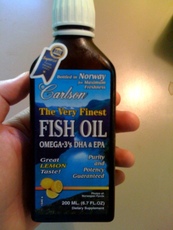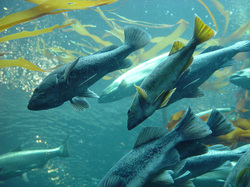 Now that the warm weather is finally here, it's time to pull out some great recipes for healthier frozen treats! This reicpe is dairy, gluten and sugar free! I have not tried this one personally yet, but you can bet I will be very soon. Thanks to my mother for finding this one and passing it along from Unstoppable Fitness Experts. Vanilla Avocado Banana Ice Cream - 1 ripe avocado - 1 medium banana (previously frozen in chunks) - 1 tsp vanilla extract - 1/2 cup almond milk - 1/2 tsp stevia or sweetener of your choice - 1 cup ice cubes Put all ingredients into a blender and blend until its all mixed. If it gets too thick, add a little extra milk. Place in a container and freeze. Before eating, let it sit for 5 minutes to thaw.
0 Comments
 Since this is Naturopathic Medicine week I thought a great place to start was with a little bit of education about Naturopathic Medicine itself. I've always been a fan of mythbusters, Jaime and Adam really know how to have some fun busting myths wide open. So I thought I could do a little mythbusting of my own by tackling some of the common myths I hear about Naturopaths and Naturopathic Medicine in general (minus the dangerous explosions of course). Myth #1 Naturopaths are the same as Homeopaths Naturopaths and Homeopaths are two different alternative medicine professions. Although it is true that as part of our training and scope of practice we learn about Homeopathy, it is one of several types of medicine we cover, and Homeopaths learn only Homeopathy. We also learn about Botanical Medicine, Nutrition, Lifestyle Counseling, Traditional Chinese Medicine and Acupuncture. Myth #2 Naturopaths aren’t primary care providers Naturopaths are able to treat most of the concerns you would normally think of going to see your family doctor for. From acute colds and flus, to chronic aches and pains we’ve got you covered. If we’re unable to help you, then we will refer you as appropriate for your best care. [Click here to see a more complete list] Myth #3 Naturopaths aren’t trained professionals like Family Doctors While it is true that our training programs aren’t identical down to the last, our first two years of school are actually very similar to what your family doctor did. There is a large focus on the core sciences (anatomy, physiology and biochemistry) like in traditional medical schools, with a slightly heavier focus on learning our other therapies in the last two years. ProHealth recently put out a professional comparison chart that included Naturopaths, Osteopaths, Massage Therapists, Medical Doctors, Physiotherapists and Chiropractors in terms of total training and certain key areas such as anatomy. For overall training, Naturopaths (ND) and Medical Doctors (MD) were almost the same for total hours of training. If you’re interested in seeing those charts, click here, you may be surprised by some of the results.  Myth #4 Naturopathic Care is really expensive I could write an entire article about why this is not true. In fact I would argue that we can save people money. To highlight an example I see on a fairly regular basis I’ll use supplements. Many people take supplements that they’ve picked up themselves because they’ve read somewhere it would be good for them, or a friend of a friend suggested it, or a certain celebrity doctor who has his own show featured the product last week. As a result, some of my patients will show up in my office with a grocery bag full of supplements. Naturopathic Doctors are highly-trained professionals with clinical experience in Clinical Nutrition and Herbal Medicine; we know the correct dosages required for optimal health, what supplements actually work and which foods contain the nutrients that you need. Not to mention there are many factors that influence the absorption of nutrients in the body. Take iron for example, did you know Vitamin C will increase its absorption whereas coffee will decrease it? If you’re anemic and you’re trying to get your iron stores up, that’s going to be important information to know if you want your iron supplement to be effective instead of a waste of money. Myth #5 Naturopathic Medicine is like Voodoo magic This one is a very interesting one that can potentially be approached in a few ways. I think what this myth really highlights is that we haven’t educated enough of the general public yet about what Naturopathic Medicine is, and what a Naturopath does. To set the record straight, I do not have a set of enchanted chicken bones in my office to consult for diagnostic purposes. What I do have is a stethoscope, blood pressure cuff, and various other medical tools much like you’d find in your Family Doctor’s office to assist me in performing a physical exam after taking a thorough health history to determine a likely diagnosis and course of treatment. As I mentioned before, we take the same sorts of courses as your family doctor, including assessment and diagnostics. We also have a regulatory board that ensures that we don’t practice anything outside our scope of practice. Last I checked, chanting around a bubbling cauldron was not part of that scope. However, there are people out there who do use similar names like Nature Doctor or Natural Therapist. These people are not trained and certified Naturopaths. If you want to check if your Naturopathic Doctor is registered, contact our organizations such as the OAND or CAND or the regulatory body, BDDT-N (soon to be College of Naturopaths of Ontario). Hopefully this helps you understand what Naturopaths do and don't do a little bit better. If you have any questions about what was discussed here or something else altogether, feel free to contact me through the contact me section of my website or come see me in the clinic. I'm always happy to see new patients. Also, be sure to keep an eye out for more info about Naturopathic Medicine I'll be posting throughout the week.  One of the most talked about supplements after probiotics is fish oil. Many Naturopaths prescribe it, and some people take it just because they’ve heard it’s good for them. So is there something to all this excitement, or is it just hype and good marketing? There are many reasons why fish oil is potentially a good supplement, from a growing baby to adult. These healthy fats help create a healthy brain, decreases risk of certain cancers, decreases overall heart disease, decreases and treats depression, and so on. There are two main components: EPA (eicosapentaenoic acid) and DHA (docosahexanoic acid), which are the long chain fatty acids known as omega 3s. They are naturally found in fish and shellfish, and nut oils like walnuts. These two together, are the omega 3s that research focuses on, and they are important because of the effect they have on inflammation. In general, they decrease or mediate inflammation in the body, which is involved in many disease processes like the ones mentioned above. Getting Enough If you want to get a good amount of these essential fatty acids in your diet, most people can achieve this if you can consume 2 eight-ounce servings of fish each week. However, if you are pregnant, nursing or have a particular health condition then you may need more than that. For example, a growing baby needs a lot of DHA to make a healthy brain. A full term baby needs 2400 mg DHA per day until 3 months postpartum. This can be achieved with cod liver oil, or a good EPA and DHA supplement or eating fish 24/7. You would need to eat about 3 lbs of oily fish, (sardines, mackerel, herring, or wild salmon) every day or more if you’re only eating white fish. A Note on Toxins Unfortunately, due to poor fishing practices and certain industrial processes heavy metals are a legitimate concern when consuming fish and fish products. Mercury and polychlorinated biphenyls (PCBs) are common toxins in seafood. As a general rule when considering the cumulative effect of these toxins, the higher up the food chain, the greater the toxic load. So fish that eat plants, will have a lower toxin load than fish that eat other fish.
 Getting the Most Benefit from Omega 3s You can take several steps to ensure you’re getting the optimal benefits from fish. Ask your Naturopath/healthcare provider: There are many different fish oil supplements on the market, get assistance from your healthcare provider to select one that is low risk for heavy metals and toxins and provides the most benefit for your money. Make sure that your fish are selected from a good source: Read the labels on your food so you know where your fish is coming from and how it has been processed. Two good online sources are:
Do the sniff test. Buy the freshest fish you can find. The longer a fish is exposed to oxygen, the more it loses some of its omega-3 benefits. Cook it right: You can’t cook the toxins out, but you can minimize exposure by removing the skin and surface fat prior to eating. Note: Talk to your Naturopathic Doctor today about getting assessed and treated if needed, and as always talk to your health care provider before beginning any new medication or supplement. References: Phillipson-Webb, L. 2010. Sprout Right: Nutrition from Tummy to Toddler. Penguin Canada. Romm, A. 2003. Naturally Healthy Babies and Children: A Commonsense Guide to Herbal Remedies, Nutrition, and Health. Celestial Arts. Stuart, A. What to Know about Omega 3s and Fish. WebMD. http://www.webmd.com/diet/features/what-to-know-about-omega-3s-and-fish?page=3. Reviewed October 17, 2011. |
Sarah Connors
I am a Naturopathic Doctor and Doula providing care in the Kitchener-Waterloo area. I have a passion for helping people with their health issues and improving the birth experience for Moms, and their babies. I also have a life long love affair with soccer, curling, and the alto saxophone. Archives
November 2020
Categories
All
|
Photos from Rural Royalty, manu flickr2010, Ryan Dickey, wocintechchat, huskyte77, paulswansen, Black Room Photography, harum.koh, Emery Co Photo, JeepersMedia, BrownGuacamole, wellnesswildflower, JeepersMedia, vastateparksstaff, colindunn, seelensturm, /\ \/\/ /\, 50mm.za, The Simpsons (Lee, Shirley, Luke and Rachel), AGRONAUTI, aivas14, Jonathan Rolande, winnifredxoxo, juhansonin, osseous, nan palmero, Theo Crazzolara, brianfagan, TP studio, wuestenigel, torbakhopper, anka.albrecht, Michael Stern, [-ChristiaN-], franchiseopportunitiesphotos, terren in Virginia, nateOne, barnimages.com, Dun.can, wuestenigel, @lattefarsan, amandabhslater, aphrodite-in-nyc, nutritionaldoublethink, Anne Worner, donnierayjones, mikecogh, angeloangelo, Rob.Bertholf, getaiwan, Lida Rose, matsuyuki, SurFeRGiRL30, marcoverch, amsfrank, mdaltry, nutrition education, Mike Prince, Edsel L, Neighborhood Nini, philipp.alexander.ernst, Mediocre2010, homethods, quinn.anya, Gamma Man, katerha, Eric Kilby, National Institutes of Health (NIH), rcmd_cfdfw_5_2, curtis palmer, Ray in Manila, frankieleon, Airsoftpal.com, byzantiumbooks, cchana, Brian Legate, Matt Lavin, BradHinton, monpetitchouphotography, wuestenigel, alexisjordanlewis, ByEPhotos, erix!, RLHyde, return the sun, quinn.anya, mliu92, frankieleon, loudista, Lyn Lomasi, upslon, derrickbrutel, cchana, National Institutes of Health (NIH), watts_photos, marcoverch, derrickbrutel, francesbean, weegeebored, Airsoftpal.com, Etwood, wu_135, shixart1985, Ingrid Taylar, VeritasFotografie, BioDivLibrary, emmanuelmorales1, Thanks for 1.5 Million Views!!, Will Merydith, reader of the pack, RoxyHobbs, Khanelle Prod' Medias, storyvillegirl, agromonitor, Arenamontanus, six:eleven, cote, SweetOnVeg, nenoirenediaz, lucianvenutian, markhillary, anotherlunch.com, inkknife_2000, archibald jude, rawtrigger, Imaginary Museum Projects: News Tableaus, Pavel P., Courtney Emery, Thien Gretchen, physiognomist, bark, Michigan Municipal League (MML), alberth2, Merelymel13, neofob, Care_SMC, Parker Knight, B*2
 RSS Feed
RSS Feed
